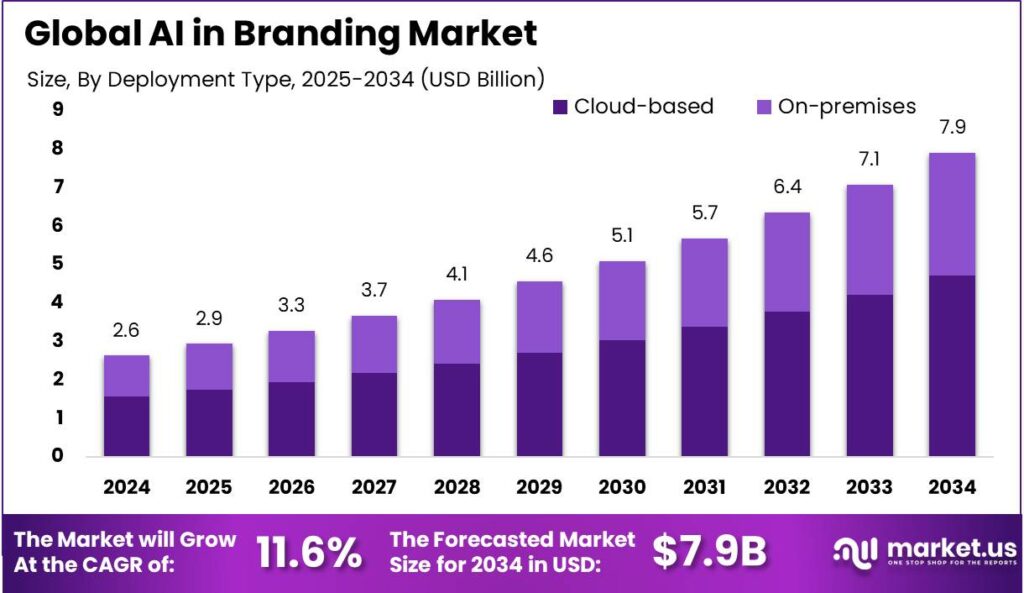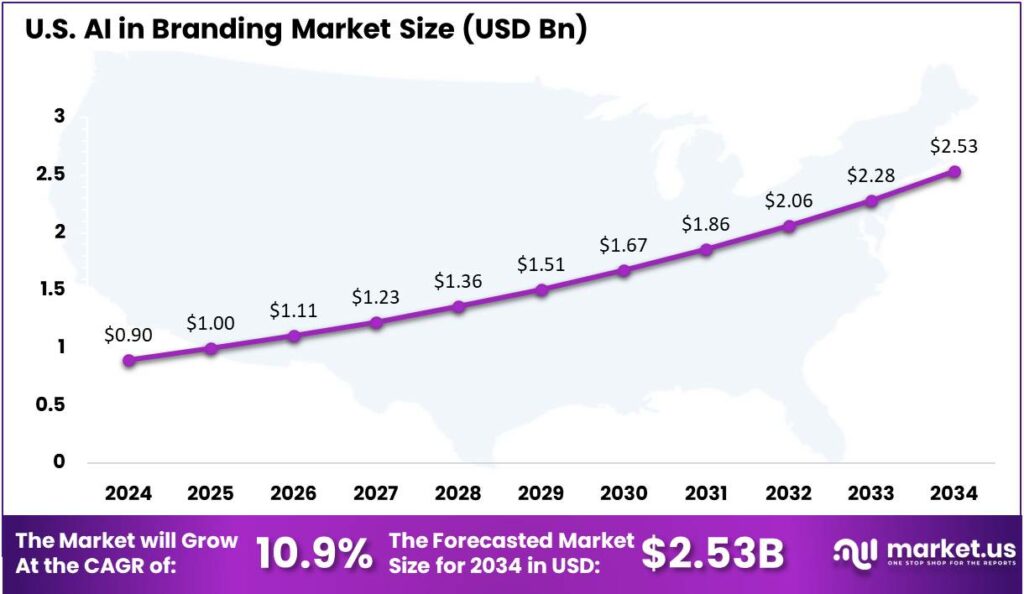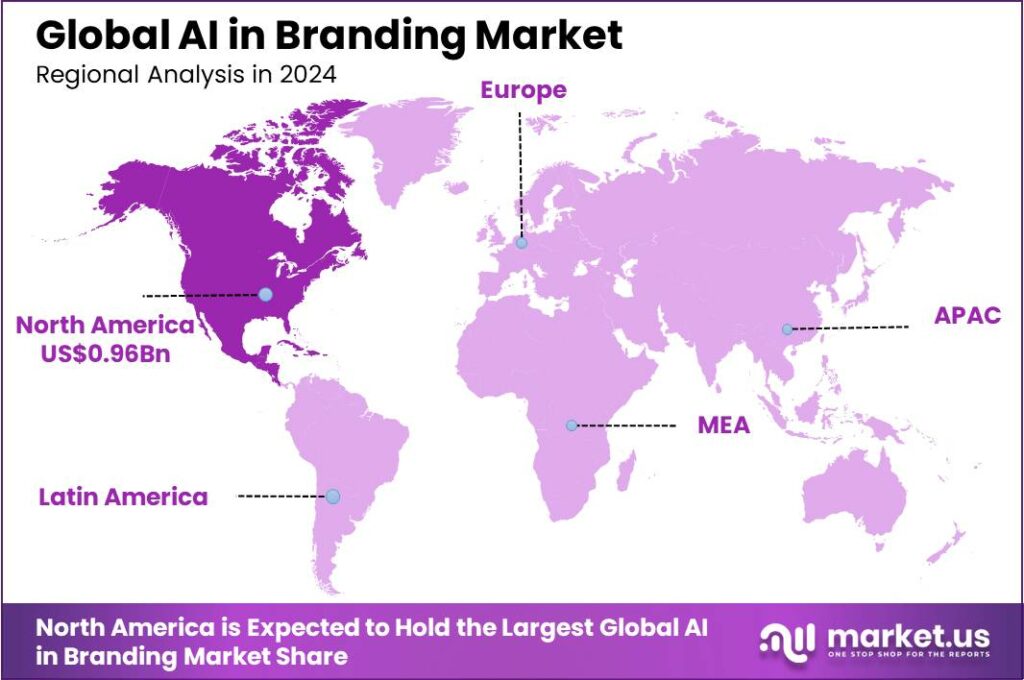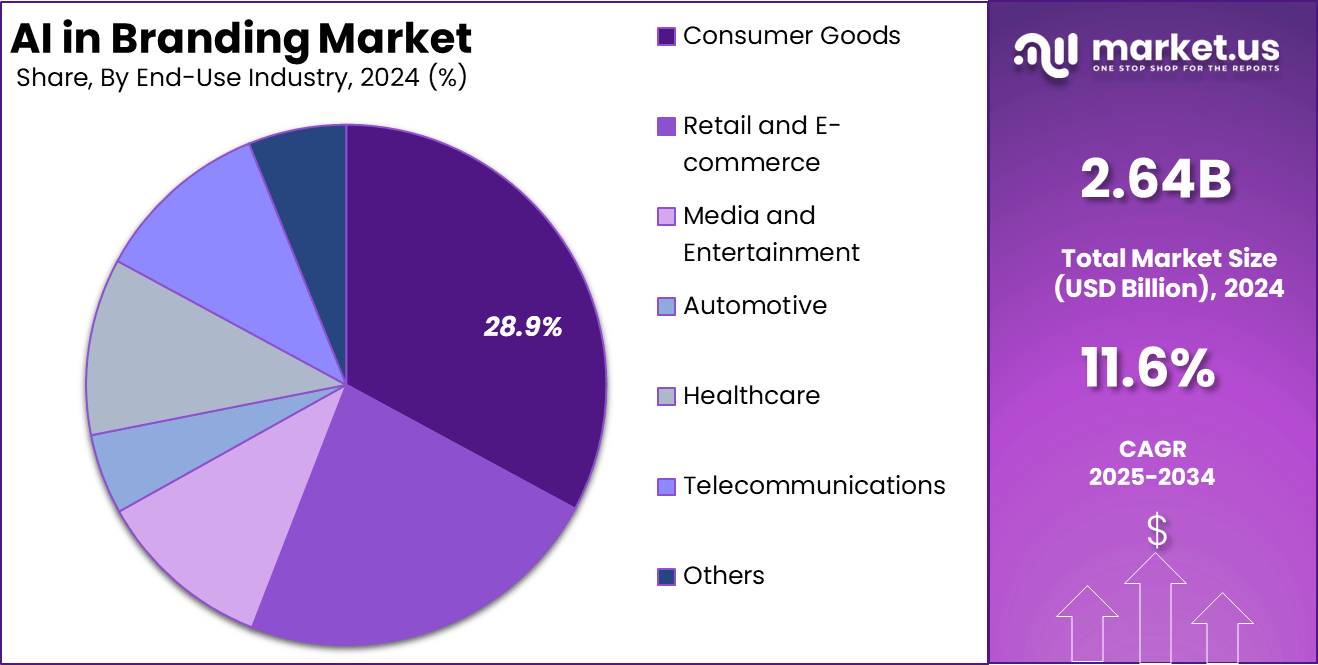Global AI in Branding Market Size, Share, Statistics Analysis Report By Deployment Type (Cloud-based, On-premises), By Application (Branding Strategy Development, Content Creation & Management, Campaign Optimization, Brand Monitoring & Sentiment Analysis, Creative Design, Others), By End-Use Industry (Consumer Goods, Retail and E-commerce, Media and Entertainment, Automotive, Healthcare, Telecommunications, Others), Region and Companies - Industry Segment Outlook, Market Assessment, Competition Scenario, Trends and Forecast 2025-2034
- Published date: April 2025
- Report ID: 145403
- Number of Pages: 283
- Format:
-
keyboard_arrow_up
Quick Navigation
- Report Overview
- Key Takeaways
- Impact of AI on Branding
- Business Benefits
- U.S. AI in Branding Market
- Deployment Type Analysis
- Application Analysis
- End-Use Industry Analysis
- Key Market Segments
- Driver
- Restraint
- Opportunity
- Challenge
- Emerging Trends
- Key Player Analysis
- Top Opportunities for Players
- Recent Developments
- Report Scope
Report Overview
The AI in Branding Market size is expected to be worth around USD 7.9 Billion By 2034, from USD 2.64 Bn in 2024, growing at a CAGR of 11.60% during the forecast period from 2025 to 2034. In 2024, North America dominated the AI in Branding market with over 36.4% share and USD 0.96 bn in revenue. The U.S. market was valued at USD 0.9 bn and is projected to grow at a CAGR of 10.9%.
Artificial Intelligence (AI) in branding encompasses the strategic use of AI technologies to enhance brand management and marketing. AI facilitates hyper-personalization, automated content creation, and improved operational efficiency, which significantly boosts customer engagement and loyalty. AI analyzes large datasets on consumer behavior and preferences to create personalized experiences, leading to higher customer satisfaction and improved conversion rates.
The market for AI in branding is expanding due to its ability to streamline complex processes and create dynamic brand experiences. AI-driven tools analyze market trends and consumer habits, offering data-driven insights that inform creative and operational decisions. This technology is employed in various aspects of branding, from generating visual content like logos and marketing materials to deploying AI chatbots for enhanced customer service.

Key drivers for the AI in branding market include the demand for personalized consumer experiences and the need for efficiency in content creation and brand management. AI’s ability to process and analyze large amounts of data in real time allows brands to deliver highly customized content and recommendations, significantly enhancing user engagement and satisfaction.
According to a SurveyMonkey study, 51% of people are leveraging AI tools to enhance their content, particularly for email campaigns and search engine optimization (SEO). It helps identify trends and consumer preferences, allowing brands to adapt quickly. Automation of repetitive tasks boosts productivity, reduces costs, and frees up resources for creative and strategic work.
The demand for AI in branding is bolstered by the increasing necessity for brands to maintain relevance in a rapidly evolving digital landscape. Market trends indicate a shift towards automation and intelligence in marketing strategies, where AI tools provide crucial insights and foster timely decision-making
The adoption of AI technologies in branding is accelerating due to their profound impact on market research, customer service, and content personalization. Brands are increasingly relying on AI to gain insights into consumer behavior, predict market trends, and automate interactions, ensuring consistency and reliability across customer touchpoints.
Brands adopt AI technologies primarily to enhance customer experience and operational efficiency. AI enables brands to deliver personalized content and interact with consumers in real-time, which are crucial for building loyalty and trust. Additionally, AI streamlines branding efforts by automating routine tasks, allowing brands to focus on strategic growth activities.
Key Takeaways
- The Global AI in Branding Market size is expected to reach around USD 7.9 Billion by 2034, up from USD 2.64 Billion in 2024, reflecting a CAGR of 11.60% during the forecast period from 2025 to 2034.
- In 2024, the Cloud-based segment held a dominant position in the AI in branding market, capturing more than 59.6% of the market share.
- The Content Creation & Management segment held a major share of the market in 2024, accounting for over 26.7%.
- In 2024, the Consumer Goods segment captured the largest market share in AI in branding, with more than 28.9%.
- North America held the dominant market position in 2024, capturing more than 36.4% of the AI in Branding sector, with revenues totaling USD 0.96 billion.
- The market for artificial intelligence in branding within the United States was estimated at USD 0.90 billion in 2024 and is projected to grow at a CAGR of 10.9%.
Impact of AI on Branding
- Enhanced Personalization: AI enables brands to analyze vast amounts of customer data, facilitating the creation of personalized marketing messages. This approach leads to increase in conversion rates, as companies can tailor content to individual preferences.
- Improved Efficiency in Content Creation: By automating tasks such as drafting and suggesting content, AI streamlines the content creation process. This automation allows marketing teams to focus more on strategic initiatives, thereby enhancing overall productivity. The BusinessDasher report reveals that 43% of marketers believe AI accelerates the content creation process.
- Data-Driven Decision Making: AI’s capability to process and interpret large datasets supports informed decision-making. Marketers can identify trends and predict consumer behavior, leading to more effective branding strategies.
- AI Consistent Brand Messaging and Advertising : AI assists in maintaining uniformity across various marketing channels by aligning content with established brand values. This consistency reinforces brand identity and fosters consumer trust. According to Google Ads, AI-powered advertising boosts click-through rates (CTR) by 25%, with real-time optimization ensuring ads reach the right audience at the perfect moment.
- Innovative Customer Interactions: Through AI-driven tools like chatbots and virtual assistants, brands can offer interactive and responsive customer experiences. These technologies enhance engagement and satisfaction by providing immediate and accurate support.
Business Benefits
According to the BusinessDasher report, companies that have integrated AI into their marketing strategies have seen sales boost by as much as 6.2%. Additionally, 26% of marketers in the U.S. have credited AI and machine learning with enhancing their content optimization efforts.
AI technologies enable brands to offer hyper-personalized experiences through detailed analysis of customer behavior, preferences, and past interactions. According to Accenture, 91% of consumers are more inclined to shop with brands offering personalized experiences. AI tools help make this personalization both scalable and precise.
AI’s ability to monitor and analyze campaign performance in real-time enables brands to make immediate adjustments to their marketing strategies, enhancing the effectiveness of their branding efforts, customer conversion rates and maximizing ROI. The Evergage report reveals that AI-driven personalization boosts conversion rates by 202%, with tailored content and offers fueling greater engagement and increased sales.
U.S. AI in Branding Market
In 2024, the market for artificial intelligence in branding within the United States was estimated at USD 0.90 billion. It is projected to expand at a compound annual growth rate (CAGR) of 10.9%. The robust growth in the AI branding sector can be attributed to several key drivers.
Firstly, the increasing integration of AI technologies in marketing strategies enhances personalized customer interactions and optimizes branding efforts. Companies are leveraging AI to analyze consumer behavior patterns, enabling more targeted and effective marketing campaigns.
Furthermore, the development of sophisticated AI applications such as chatbots, recommendation engines, and automated content creation tools has significantly transformed the branding landscape. These technologies not only streamline operations but also ensure a consistent brand experience across various digital platforms.
The U.S. market for AI in branding is expected to see continued growth, driven by technological advancements and increasing acceptance of AI solutions across different industry sectors. As AI tools become more refined, they are likely to become integral to the branding strategies of more companies, helping them gain a competitive edge in their respective markets.

In 2024, North America held a dominant market position in the AI in Branding sector, capturing more than a 36.4% share, with revenues amounting to USD 0.96 billion. This leadership is largely attributed to several region-specific factors that support advanced technological adoption and development.
The presence of a robust technological infrastructure and the concentration of leading AI technology firms in North America are significant contributors to its market leadership. The region is home to global tech giants and innovative startups that are at the forefront of AI research and application development. These companies not only drive innovation within the region but also set global industry trends.
The North American market thrives on substantial investments in AI and related technologies, with both public and private sectors driving innovation. Significant R&D investments fuel advancements in AI applications for branding. For instance, the U.S. government has launched initiatives to promote AI research and ensure its ethical integration across various industries.
Looking at the broader implications, the dominance of North America in the AI branding market is likely to persist as companies continue to leverage AI for customer relationship management, digital advertising, and content creation. The demand for AI-powered solutions that offer enhanced consumer insights and automated decision-making is expected to drive further growth in this region.

Deployment Type Analysis
In 2024, the Cloud-based segment held a dominant market position within the AI in branding market, capturing more than a 59.6% share. This significant market share is primarily driven by the flexibility and scalability that cloud-based solutions offer.
Businesses, especially those with varying operational scales and geographies, prefer cloud-based AI solutions because they require lower upfront investments and are easier to upgrade. Additionally, cloud platforms facilitate seamless integration with existing digital ecosystems, which is crucial for companies looking to implement AI without disrupting their ongoing operations.
The cloud-based segment thrives due to its advanced data analytics and storage capabilities. As brands rely more on data-driven strategies, the need for scalable data solutions grows. Cloud-based AI platforms efficiently handle large datasets, enabling real-time analysis and insights essential for dynamic branding.
The adoption of cloud-based AI in branding is also driven by its accessibility. Small to medium-sized enterprises (SMEs) benefit from cloud solutions, as they can implement advanced AI tools without needing extensive IT infrastructure or specialized staff. This democratization of technology helps smaller brands compete more effectively with larger corporations.
Application Analysis
In 2024, the Content Creation & Management segment held a dominant market position, capturing more than a 26.7% share of the market. This segment leads primarily due to the escalating demand for dynamic and personalized content across multiple digital platforms.
Brands are increasingly relying on AI to automate content generation, tailor messaging to specific audiences, and manage large volumes of content across different channels efficiently. This not only enhances engagement with consumers but also ensures consistency in brand messaging, a critical factor in maintaining brand integrity and customer loyalty.
Moreover, the leadership of the Content Creation & Management segment can be attributed to its significant impact on reducing operational costs and improving marketing effectiveness. AI-powered tools in this segment streamline the content development process, from ideation to distribution, thereby speeding up time-to-market and reducing the workload on human resources.
Another factor contributing to the prominence of this segment is its role in enhancing the scalability of branding efforts. As businesses expand globally, the ability to manage content tailored to diverse markets becomes crucial. AI enables brands to automate and localize content at scale, ensuring market relevance and enhancing consumer engagement across different regions.
End-Use Industry Analysis
In 2024, the Consumer Goods segment held a dominant market position in the AI in Branding market, capturing more than a 28.9% share. This sector’s leadership can be attributed to several key factors that underscore the pivotal role of AI in transforming consumer engagement and brand strategy.
The Consumer Goods industry is increasingly reliant on AI to understand and predict consumer behavior, enabling brands to offer personalized experiences at scale. AI technologies such as machine learning algorithms and data analytics are extensively used to analyze consumer data and derive insights that help in tailoring marketing messages and product recommendations.
Moreover, the competitive nature of the Consumer Goods sector drives the adoption of innovative technologies to gain a market advantage. AI-powered tools are employed to optimize supply chains, predict market trends, and manage inventory more efficiently, ensuring that companies can meet consumer demand promptly and effectively.
The Consumer Goods industry benefits from the rapid evolution of consumer technologies and digital media. AI plays a key role in optimizing platforms like social media algorithms and smart assistants for branding. As these technologies become more ingrained in daily life, AI’s role in branding will expand, helping the Consumer Goods segment maintain its market leadership.

Key Market Segments
By Deployment Type
- Cloud-based
- On-premises
By Application
- Branding Strategy Development
- Content Creation & Management
- Campaign Optimization
- Brand Monitoring & Sentiment Analysis
- Creative Design
- Others
By End-Use Industry
- Consumer Goods
- Retail and E-commerce
- Media and Entertainment
- Automotive
- Healthcare
- Telecommunications
- Others
Key Regions and Countries
- North America
- US
- Canada
- Europe
- Germany
- France
- The UK
- Spain
- Italy
- Rest of Europe
- Asia Pacific
- China
- Japan
- South Korea
- India
- Australia
- Singapore
- Rest of Asia Pacific
- Latin America
- Brazil
- Mexico
- Rest of Latin America
- Middle East & Africa
- South Africa
- Saudi Arabia
- UAE
- Rest of MEA
Driver
Enhanced Personalization in Customer Engagement
Artificial Intelligence (AI) has revolutionized branding by enabling unprecedented levels of personalization in customer engagement.AI uses advanced algorithms to analyze large datasets, identifying consumer preferences and behaviors. This enables brands to deliver personalized experiences that resonate with each customer.
For instance, AI-driven personalization can dynamically adjust marketing messages, product recommendations, and content to align with the unique interests of consumers, fostering a sense of value and understanding.
Personalized interactions powered by AI not only improve customer satisfaction but also drive higher engagement and conversion rates. Businesses leveraging AI for personalization have seen significant improvements, fostering deeper connections with customers, enhancing brand loyalty, and gaining a competitive advantage in the market.
Restraint
Data Privacy and Security Concerns
The use of AI in branding raises data privacy and security concerns, as AI systems rely on extensive personal data. This can lead to risks like unauthorized data use, hidden data collection, and algorithmic bias.
These concerns are exacerbated by the complexity of AI technologies, which can make it challenging to ensure transparency and accountability in data handling. For example, AI-driven marketing strategies that utilize personal data without explicit consent can lead to breaches of privacy regulations and erosion of consumer trust.
AI poses various privacy challenges, including unauthorized data use and covert data collection. Addressing these issues requires brands to implement robust data governance policies, ensure compliance with evolving privacy laws, and maintain transparency with consumers about data usage practices.
Opportunity
Predictive Analytics for Market Forecasting
AI’s predictive analytics capabilities present a significant opportunity for brands to enhance their market forecasting and strategic planning. By analyzing historical data and identifying patterns, AI can forecast future consumer behaviors, market trends, and demand fluctuations with a high degree of accuracy.
This enables brands to proactively adjust their marketing strategies, optimize inventory management, and personalize offerings to meet anticipated customer needs. For instance, AI-driven predictive analytics can help identify potential market opportunities and mitigate risks by providing insights into emerging trends.
AI predictive analytics optimizes marketing budgets by providing data-driven insights and forecasting outcomes. By leveraging these insights, brands can make informed decisions that enhance competitiveness and drive growth.
Challenge
Integration with Existing Systems
Integrating AI technologies into existing branding and marketing infrastructures presents a formidable challenge for many organizations. Legacy systems may not be compatible with modern AI solutions, leading to issues such as data silos, incompatible data formats, and outdated architectures.
Integration challenges can impede the smooth deployment of AI, leading to higher costs and longer implementation timelines. To overcome these, brands must invest in system upgrades, ensure data interoperability, and potentially retrain staff to manage AI technologies effectively. Addressing these challenges is key to unlocking AI’s full potential in strengthening branding strategies.
Emerging Trends
Artificial intelligence (AI) is transforming branding by introducing innovative methods that enhance how brands connect with their audiences. A significant trend is hyper-personalization, where AI analyzes extensive consumer data to tailor marketing messages and product recommendations to individual preferences, thereby improving customer engagement and loyalty.
Another emerging trend is the use of AI-generated content, including virtual influencers and models. Fashion brands like Mango have incorporated AI-generated models in their advertising campaigns, achieving faster content creation and cost efficiency. This approach allows for rapid prototyping and the development of innovative marketing strategies.
Predictive analytics is growing in importance, with AI using historical data to predict future consumer behavior and market trends, allowing brands to proactively adjust strategies. AI-powered chatbots and virtual assistants also enhance customer interactions by offering personalized, instant responses, improving satisfaction and freeing up human resources for more complex tasks.
Key Player Analysis
Leading companies have invested heavily in AI technologies to enhance their branding strategies and maintain a competitive edge.
IBM Corporation has been at the forefront of AI development for decades, and its AI solutions, especially through IBM Watson, have transformed branding and marketing. IBM offers powerful AI-driven analytics tools that enable brands to understand customer preferences, segment audiences, and predict trends.
Google LLC (Alphabet Inc.), through its parent company Alphabet, has become a leader in AI-driven branding. Its AI tools, such as Google Ads and Google Analytics, empower businesses to optimize ad campaigns, understand customer behaviors, and drive more targeted marketing.The company’s vast amount of data, combined with advanced AI, gives brands unmatched insights into consumer behavior, making Google a dominant force in AI-driven branding.
Adobe Inc., AI tools, primarily through Adobe Sensei, offer innovative solutions for branding, content creation, and marketing automation. Adobe Sensei uses AI and machine learning to streamline creative workflows, improve image and video editing, and offer insights into customer engagement. By combining AI with design tools, Adobe helps brands stay ahead in visually-driven marketing campaigns.
Top Key Players in the Market
- IBM Corporation
- Google LLC (Alphabet Inc.)
- Adobe Inc.
- Salesforce, Inc.
- Hootsuite Media Inc.
- HubSpot, Inc.
- Cortex Technology Inc.
- Kaltura, Inc.
- Baidu, Inc.
- Sentient Technologies Holdings Limited
- Cision Ltd.
- Pegasystems Inc.
- Other Major Players
Top Opportunities for Players
In analyzing AI’s potential in branding, key opportunities have emerged that brands can use to boost market presence and improve operational efficiency.
- Enhanced Personalization and Customer Interaction: AI technologies, particularly machine learning and natural language processing, will enable brands to offer highly personalized experiences and dynamic pricing strategies. By analyzing consumer behavior and data, AI can help tailor product recommendations and marketing messages, ensuring a more individualized consumer interaction.
- Content Creation and Management: AI’s ability to automate content creation will be pivotal. Brands will utilize AI not only for generating engaging and relevant content but also for curating it to ensure consistency with the brand’s voice and values. This includes creating tailored marketing messages and managing social media posts, which will streamline content pipelines and maintain brand relevancy.
- Immersive Experiences Through AR and VR: Augmented Reality (AR) and Virtual Reality (VR) will play significant roles in creating immersive and interactive brand experiences. These technologies will allow consumers to interact with products in a virtual space, enhancing customer engagement and providing a unique way to experience the brand before making a purchase.
- Data Privacy and Cybersecurity: As digital interactions increase, so does the importance of data privacy and cybersecurity. Brands will need to invest in robust security measures and be transparent about their data usage policies to build and maintain consumer trust. This will be crucial as consumers become more aware of and concerned about their personal data.
- Ethical and Sustainable Branding: There will be a greater emphasis on sustainability and ethical practices in branding. Consumers are increasingly making purchasing decisions based on a brand’s commitment to positive social and environmental impacts. Brands that demonstrate genuine commitment through clear actions and communications will gain a competitive edge.
Recent Developments
- In September 2024, Salesforce signed a definitive agreement to acquire Tenyx, a developer of AI-powered voice agents aimed at transforming customer service through natural and engaging conversational experiences.
- In November 2024, Cision announced a collaboration with Google Cloud to enhance its AI-driven communications solutions. This partnership aims to transform AI-powered communications by integrating advanced AI capabilities into Cision’s platform.
Report Scope
Report Features Description Market Value (2024) USD 2.64 Bn Forecast Revenue (2034) USD 7.9 Bn CAGR (2025-2034) 11.6% Base Year for Estimation 2024 Historic Period 2020-2023 Forecast Period 2025-2034 Report Coverage Revenue forecast, AI impact on market trends, Share Insights, Company ranking, competitive landscape, Recent Developments, Market Dynamics and Emerging Trends Segments Covered By Deployment Type (Cloud-based, On-premises), By Application (Branding Strategy Development, Content Creation & Management, Campaign Optimization, Brand Monitoring & Sentiment Analysis, Creative Design, Others), By End-Use Industry (Consumer Goods, Retail and E-commerce, Media and Entertainment, Automotive, Healthcare, Telecommunications, Others) Regional Analysis North America – US, Canada; Europe – Germany, France, The UK, Spain, Italy, Russia, Netherlands, Rest of Europe; Asia Pacific – China, Japan, South Korea, India, New Zealand, Singapore, Thailand, Vietnam, Rest of APAC; Latin America – Brazil, Mexico, Rest of Latin America; Middle East & Africa – South Africa, Saudi Arabia, UAE, Rest of MEA Competitive Landscape IBM Corporation, Google LLC (Alphabet Inc.), Adobe Inc., Salesforce, Inc., Hootsuite Media Inc., HubSpot, Inc., Cortex Technology Inc., Kaltura, Inc., Baidu, Inc., Sentient Technologies Holdings Limited, Cision Ltd., Pegasystems Inc., Other Major Players Customization Scope Customization for segments, region/country-level will be provided. Moreover, additional customization can be done based on the requirements. Purchase Options We have three license to opt for: Single User License, Multi-User License (Up to 5 Users), Corporate Use License (Unlimited User and Printable PDF) 
-
-
- IBM Corporation
- Google LLC (Alphabet Inc.)
- Adobe Inc.
- Salesforce, Inc.
- Hootsuite Media Inc.
- HubSpot, Inc.
- Cortex Technology Inc.
- Kaltura, Inc.
- Baidu, Inc.
- Sentient Technologies Holdings Limited
- Cision Ltd.
- Pegasystems Inc.
- Other Major Players












